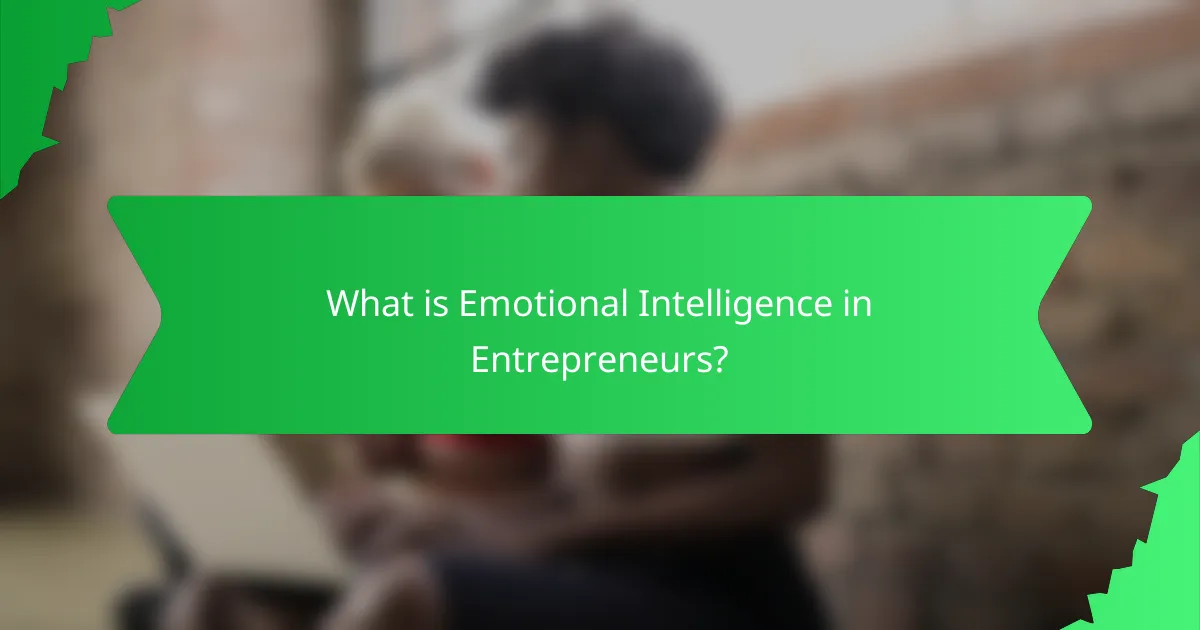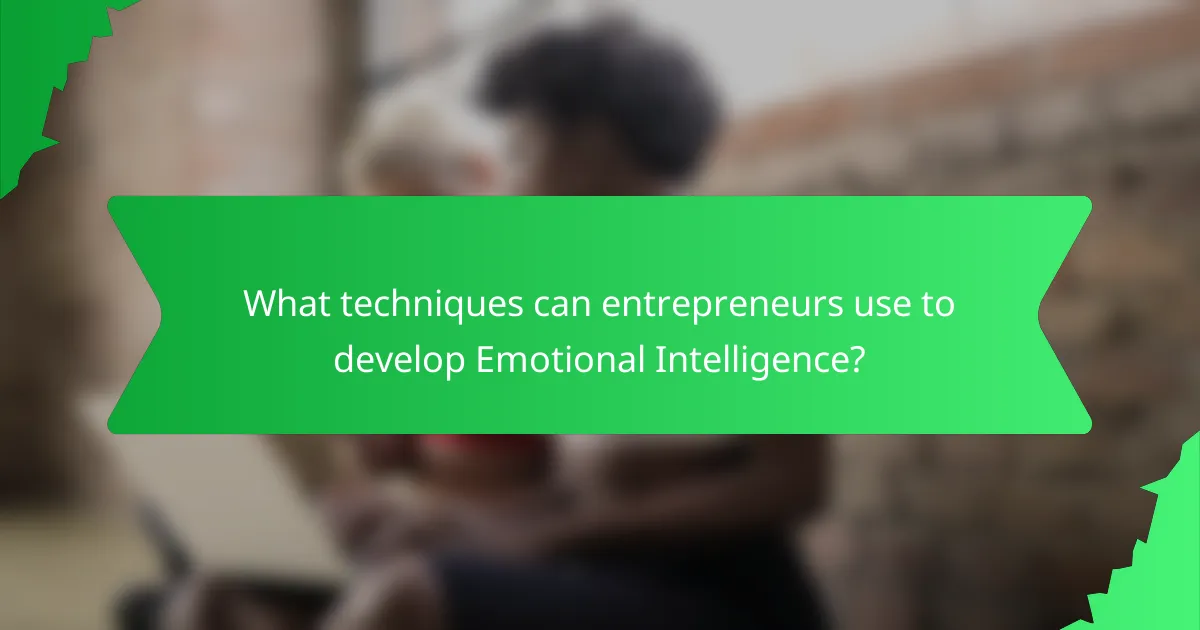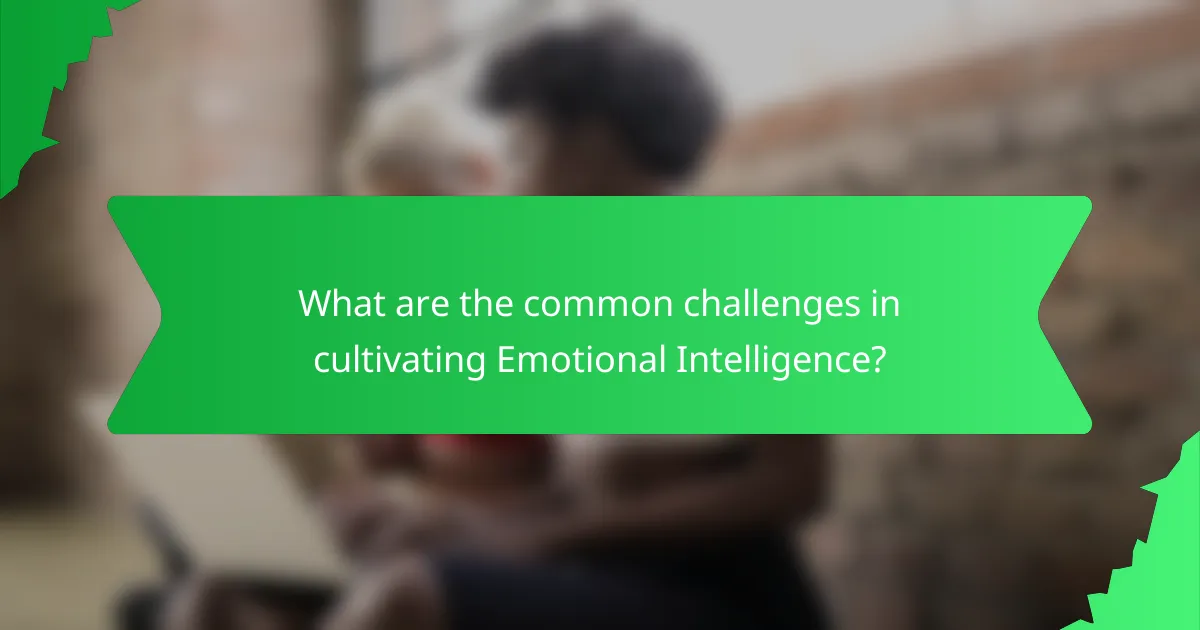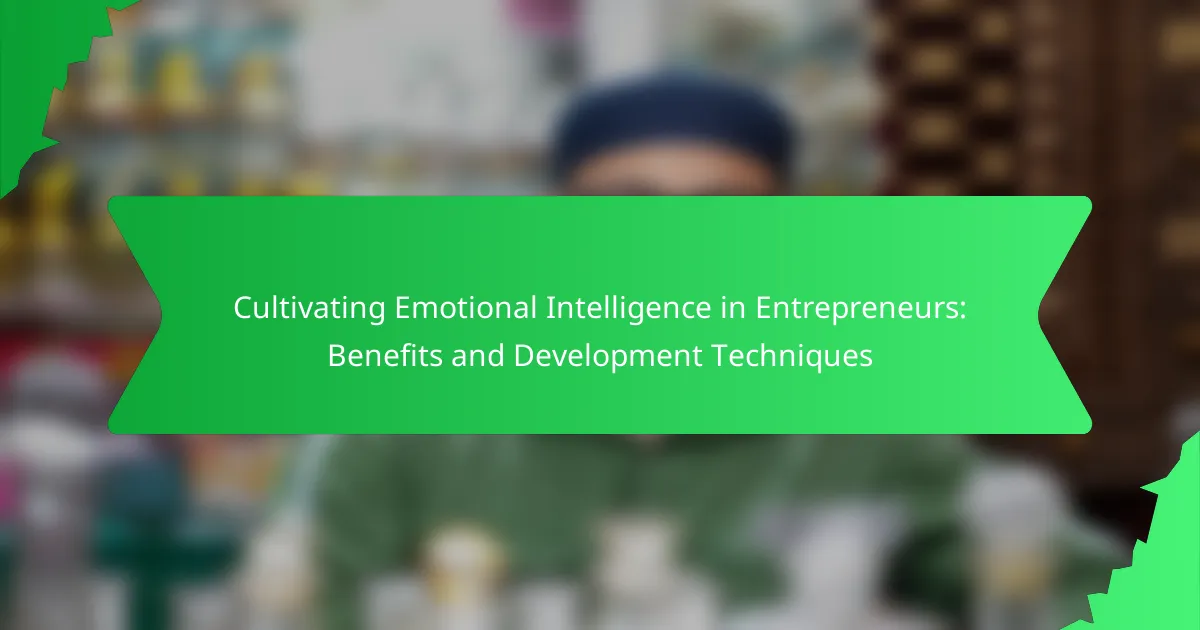Emotional intelligence (EI) in entrepreneurs encompasses the ability to recognize, understand, and manage their own emotions and those of others. This skill is essential for effective leadership, decision-making, and enhancing team dynamics, as it enables entrepreneurs to handle stress and conflict more adeptly. The article explores various techniques for developing EI, including self-reflection, active listening, seeking feedback, mindfulness practices, role-playing, and emotional regulation strategies. Additionally, it addresses common challenges faced in cultivating EI, such as self-awareness, managing emotions, and understanding others’ feelings, emphasizing the importance of ongoing practice and feedback in overcoming these obstacles.

What is Emotional Intelligence in Entrepreneurs?
Emotional intelligence in entrepreneurs refers to the ability to recognize, understand, and manage their own emotions as well as the emotions of others. This skill is crucial for effective leadership and decision-making. Entrepreneurs with high emotional intelligence can navigate the complexities of interpersonal relationships in a business environment. They are better at handling stress and conflict, which enhances team dynamics. Studies show that emotional intelligence contributes to improved performance and productivity. Research by Goleman (1995) indicates that emotional intelligence can be more important than IQ in predicting success in the workplace.
How does Emotional Intelligence impact entrepreneurial success?
Emotional Intelligence significantly impacts entrepreneurial success by enhancing decision-making and relationship-building skills. Entrepreneurs with high emotional intelligence can better understand their own emotions and those of others. This understanding leads to improved communication and collaboration within teams. Research indicates that 90% of top performers have high emotional intelligence. Additionally, emotionally intelligent entrepreneurs can navigate stress and setbacks more effectively. They are more adaptable to change and can maintain motivation. This adaptability is crucial in the dynamic business environment. Overall, emotional intelligence fosters resilience and innovation, contributing to long-term success in entrepreneurship.
What are the key components of Emotional Intelligence?
The key components of Emotional Intelligence are self-awareness, self-regulation, motivation, empathy, and social skills. Self-awareness involves recognizing one’s emotions and their impact on thoughts and behavior. Self-regulation refers to managing one’s emotions in healthy ways. Motivation is the drive to pursue goals for personal reasons rather than external rewards. Empathy is the ability to understand and share the feelings of others. Social skills encompass the skills needed to manage relationships effectively. These components are essential for effective communication and relationship building in personal and professional contexts.
How does self-awareness contribute to Emotional Intelligence?
Self-awareness is a key component of Emotional Intelligence. It allows individuals to recognize their own emotions and understand how these emotions influence their thoughts and behaviors. By being self-aware, individuals can identify their strengths and weaknesses. This understanding enables better management of emotional responses in various situations. Research shows that self-awareness leads to improved decision-making and relationship management. A study by Goleman (1995) highlights that self-aware individuals are better at empathizing with others. This ability fosters effective communication and conflict resolution. Ultimately, self-awareness enhances overall Emotional Intelligence, benefiting personal and professional relationships.
Why is cultivating Emotional Intelligence important for entrepreneurs?
Cultivating Emotional Intelligence is crucial for entrepreneurs because it enhances decision-making and leadership effectiveness. Entrepreneurs with high Emotional Intelligence can better understand and manage their emotions. This skill allows them to navigate stress and uncertainty more effectively. Improved Emotional Intelligence also fosters better relationships with employees and clients. According to a study by TalentSmart, 90% of top performers have high Emotional Intelligence. This correlates with increased productivity and team collaboration. Furthermore, emotionally intelligent entrepreneurs are more adept at resolving conflicts. This ability leads to a healthier work environment and improved overall business performance.
What are the long-term benefits of Emotional Intelligence for business leaders?
Emotional Intelligence (EI) provides significant long-term benefits for business leaders. Enhanced decision-making is one of the primary advantages. Leaders with high EI can assess situations more accurately and make informed choices. Improved team dynamics is another benefit. Emotionally intelligent leaders foster collaboration and trust among team members. This leads to higher employee satisfaction and retention rates.
Additionally, EI contributes to better conflict resolution. Leaders adept in emotional intelligence can navigate disputes effectively, minimizing disruptions. Increased adaptability is also a vital benefit. Business leaders with high EI can adjust to changing environments and challenges more smoothly.
Research indicates that organizations led by emotionally intelligent leaders often experience better overall performance. A study by the Harvard Business Review found that leaders with high EI can improve their teams’ performance by up to 30%. This demonstrates the tangible impact of EI on leadership effectiveness and organizational success.
How does Emotional Intelligence enhance decision-making?
Emotional Intelligence enhances decision-making by improving self-awareness and empathy. Self-awareness allows individuals to recognize their emotions and biases. This recognition leads to more objective assessments of situations. Empathy enables understanding of others’ perspectives and emotions. This understanding fosters better collaboration and conflict resolution. Research indicates that leaders with high emotional intelligence make more effective decisions. A study by Goleman (1998) found that emotional intelligence accounts for 67% of the skills required for effective leadership. Thus, emotional intelligence directly influences the quality of decisions made in personal and professional contexts.

What techniques can entrepreneurs use to develop Emotional Intelligence?
Entrepreneurs can develop Emotional Intelligence (EI) through various techniques. First, self-reflection is crucial. This involves regularly assessing one’s emotions and reactions. Journaling can facilitate this process. It allows entrepreneurs to track emotional patterns over time.
Second, active listening is essential. Entrepreneurs should practice fully concentrating on what others are saying. This fosters better understanding and empathy.
Third, seeking feedback from peers and mentors can enhance EI. Constructive criticism helps identify emotional blind spots.
Fourth, mindfulness practices, such as meditation, can improve self-awareness. Studies show that mindfulness increases emotional regulation.
Fifth, role-playing scenarios can build empathy. This technique enables entrepreneurs to experience others’ perspectives.
Lastly, emotional regulation strategies are vital. Techniques like deep breathing can help manage stress. Research indicates that individuals with high EI handle stress more effectively.
These techniques collectively contribute to the development of Emotional Intelligence in entrepreneurs.
How can self-reflection improve Emotional Intelligence?
Self-reflection can significantly improve Emotional Intelligence (EI) by enhancing self-awareness and self-regulation. Self-awareness allows individuals to recognize their emotions and understand how these feelings affect their thoughts and behaviors. This recognition is crucial for managing emotional responses effectively.
Moreover, self-reflection fosters empathy, which is a core component of EI. By reflecting on personal experiences and emotions, individuals can better understand the emotions of others. This understanding leads to improved interpersonal relationships and communication skills.
Research indicates that individuals who engage in self-reflection demonstrate higher levels of EI. A study published in the Journal of Applied Psychology found that self-reflection practices correlate with increased emotional awareness and interpersonal effectiveness. This correlation suggests that self-reflection is a valuable tool for developing EI in various contexts, including entrepreneurship.
What practices can entrepreneurs implement for effective self-reflection?
Entrepreneurs can implement several practices for effective self-reflection. Regular journaling allows them to document thoughts, feelings, and experiences. This practice enhances self-awareness and clarity. Setting aside time for meditation can foster mindfulness. Mindfulness helps entrepreneurs observe their thoughts without judgment. Seeking feedback from peers provides external perspectives. Constructive criticism can reveal blind spots in their thinking. Engaging in goal-setting sessions encourages entrepreneurs to evaluate their progress. This practice aligns actions with personal and professional objectives. Lastly, participating in coaching or mentoring can offer structured reflection. Coaches guide entrepreneurs through self-discovery processes. These practices collectively enhance emotional intelligence and decision-making skills.
How can journaling aid in developing Emotional Intelligence?
Journaling can significantly aid in developing Emotional Intelligence by providing a structured outlet for self-reflection. It allows individuals to express their thoughts and emotions freely. This practice enhances self-awareness, a core component of Emotional Intelligence. By regularly documenting feelings, individuals can identify emotional patterns and triggers. Recognizing these patterns contributes to better emotional regulation. Additionally, journaling fosters empathy by encouraging individuals to explore perspectives beyond their own. Research indicates that reflective writing can improve emotional understanding and interpersonal skills. A study published in the Journal of Personality and Social Psychology found that expressive writing helps individuals process emotions and enhances emotional clarity. Thus, journaling serves as a practical tool for entrepreneurs seeking to cultivate their Emotional Intelligence.
What role does empathy play in developing Emotional Intelligence?
Empathy is essential in developing Emotional Intelligence. It allows individuals to understand and share the feelings of others. This understanding fosters better communication and relationships. Empathy enhances self-awareness by helping individuals recognize their emotional responses. It also aids in managing emotions effectively in social situations. Research shows that high empathy correlates with improved leadership skills. A study by Goleman (1995) indicates that empathy is a key component of Emotional Intelligence. Thus, empathy significantly contributes to the growth of Emotional Intelligence.
How can entrepreneurs practice empathy in their daily interactions?
Entrepreneurs can practice empathy in their daily interactions by actively listening to others. This involves giving full attention and understanding the emotions behind their words. They can ask open-ended questions to encourage deeper conversations. Acknowledging feelings shows that they value others’ perspectives.
Additionally, entrepreneurs should put themselves in others’ shoes to understand their experiences. This helps in recognizing the challenges faced by employees or customers. Non-verbal communication, such as maintaining eye contact and using appropriate body language, reinforces empathy.
Furthermore, providing feedback that reflects understanding can strengthen relationships. Entrepreneurs can also share personal experiences to create a connection. Research indicates that empathetic leaders foster better teamwork and higher employee satisfaction. Thus, practicing empathy can lead to a more positive work environment and improved business outcomes.

What are the common challenges in cultivating Emotional Intelligence?
Common challenges in cultivating Emotional Intelligence include self-awareness, managing emotions, and understanding others’ emotions. Self-awareness is often hindered by biases and blind spots. Individuals may struggle to accurately assess their emotional states. Managing emotions can be difficult, especially in high-stress situations. This often leads to impulsive reactions rather than thoughtful responses. Understanding the emotions of others requires empathy, which can be challenging for many. Misinterpretations can occur, leading to conflicts. Additionally, societal norms may discourage emotional expression, further complicating the development of Emotional Intelligence. Developing these skills often requires ongoing practice and feedback, which can be difficult to obtain.
What obstacles do entrepreneurs face in developing Emotional Intelligence?
Entrepreneurs face several obstacles in developing Emotional Intelligence. One significant challenge is the lack of self-awareness. Many entrepreneurs struggle to recognize their own emotions and how they affect their decision-making. This can lead to poor interpersonal relationships and ineffective leadership.
Another obstacle is time constraints. Entrepreneurs often prioritize business operations over personal development. This leaves little time for reflection or emotional growth. Additionally, high stress levels can hinder emotional regulation. When under pressure, entrepreneurs may react impulsively rather than thoughtfully.
Furthermore, limited access to feedback can impede growth. Entrepreneurs may not receive constructive criticism regarding their emotional behaviors. This can stall their development in recognizing and managing emotions.
Lastly, cultural factors can play a role. In some environments, emotional expression is undervalued. This can discourage entrepreneurs from pursuing emotional intelligence as a priority. These obstacles collectively hinder the emotional growth necessary for effective leadership and business success.
How can entrepreneurs overcome resistance to change in Emotional Intelligence?
Entrepreneurs can overcome resistance to change in Emotional Intelligence by fostering a growth mindset. This mindset encourages adaptability and openness to new ideas. Training programs can enhance Emotional Intelligence skills, such as self-awareness and empathy. Regular feedback sessions promote reflection and improvement in emotional skills. Creating a supportive environment helps employees feel safe to express emotions. Research shows that organizations with high Emotional Intelligence have better performance outcomes. For example, a study by Goleman (1995) indicates that Emotional Intelligence contributes significantly to leadership effectiveness. By implementing these strategies, entrepreneurs can effectively navigate and reduce resistance to change.
What strategies can help in managing stress to enhance Emotional Intelligence?
Practicing mindfulness can effectively manage stress and enhance Emotional Intelligence. Mindfulness techniques, such as meditation and deep breathing, help individuals focus on the present moment. This focus reduces anxiety and increases self-awareness. Research shows that mindfulness can improve emotional regulation. Enhanced emotional regulation leads to better interpersonal relationships. Engaging in regular physical activity also helps manage stress. Exercise releases endorphins, which improve mood and reduce feelings of stress. Additionally, maintaining a balanced diet supports overall mental health. A nutritious diet can positively impact mood and energy levels. Finally, seeking social support is crucial. Conversations with trusted friends or mentors can provide perspective and alleviate stress.
What practical tips can entrepreneurs follow to enhance their Emotional Intelligence?
Entrepreneurs can enhance their Emotional Intelligence by practicing self-awareness. This involves recognizing their emotions and how these affect their thoughts and behavior. Regular reflection on personal experiences can improve this skill.
Another practical tip is to develop empathy. Entrepreneurs should actively listen to their team members. Understanding others’ perspectives fosters better communication and collaboration.
Additionally, managing stress is crucial. Techniques such as mindfulness and meditation can help entrepreneurs stay calm under pressure. This contributes to better decision-making.
Building strong relationships is also important. Entrepreneurs should invest time in networking and nurturing connections. Positive relationships enhance emotional support and resilience.
Lastly, seeking feedback can provide valuable insights. Entrepreneurs should ask for constructive criticism from peers and mentors. This feedback can highlight areas for improvement in emotional understanding and regulation.
How can networking contribute to Emotional Intelligence development?
Networking enhances Emotional Intelligence development by providing opportunities for interpersonal interactions. Engaging with diverse individuals fosters self-awareness and empathy. These interactions challenge one’s perspectives and encourage active listening. Networking also facilitates feedback, which is crucial for emotional growth. Studies show that professionals with strong networks exhibit higher Emotional Intelligence. They are better at managing relationships and navigating social complexities. This improvement leads to enhanced collaboration and conflict resolution skills. Ultimately, networking serves as a practical platform for refining Emotional Intelligence.
What resources are available for entrepreneurs to learn about Emotional Intelligence?
Entrepreneurs can access various resources to learn about Emotional Intelligence. Books such as “Emotional Intelligence 2.0” by Travis Bradberry and Jean Greaves provide practical insights. Online courses from platforms like Coursera and Udemy offer structured learning. Workshops and seminars by organizations like the Emotional Intelligence Network enhance experiential learning. Podcasts focusing on Emotional Intelligence also provide valuable discussions. Research articles in journals like the “Journal of Organizational Behavior” present empirical studies on the topic. These resources collectively support entrepreneurs in developing their Emotional Intelligence skills.
Cultivating Emotional Intelligence (EI) in entrepreneurs is essential for enhancing decision-making, leadership effectiveness, and interpersonal relationships. This article explores the definition of emotional intelligence, its impact on entrepreneurial success, and the key components, including self-awareness, empathy, and social skills. It discusses techniques for developing EI, such as self-reflection, active listening, and mindfulness practices, while also addressing common challenges faced by entrepreneurs in this area. Additionally, the article highlights the long-term benefits of emotional intelligence for business leaders and offers practical tips for improving these skills to foster resilience and innovation in a dynamic business environment.
